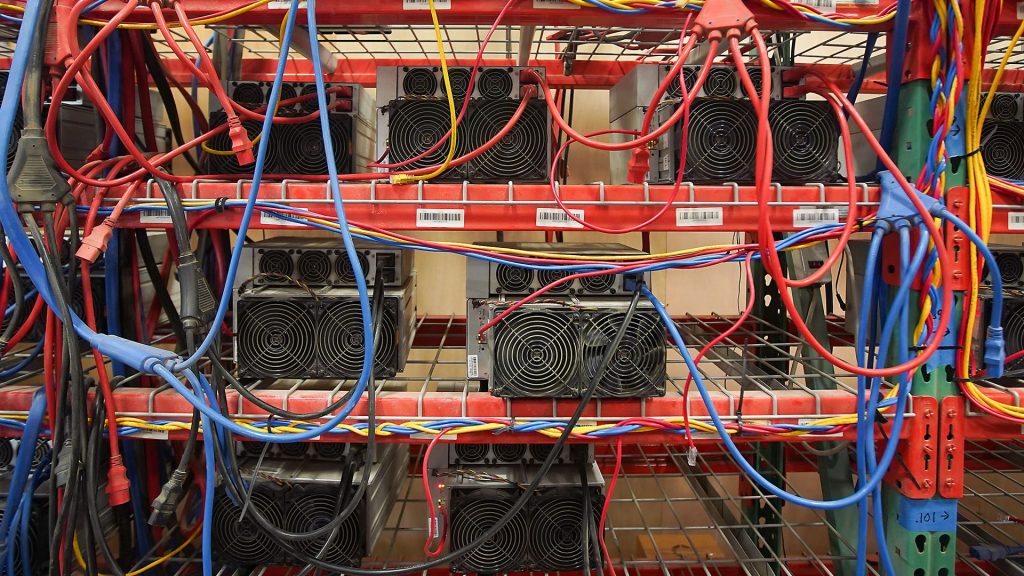Exclusive: SAN reporter’s inquiry into Texas’ Bitcoin mines triggers lawsuit

The Public Utility Commission (PUC) of Texas wants to block the release of data on cryptocurrency mining, due to concerns that public disclosure could lead to acts of terrorism. In a June lawsuit against Texas Attorney General Ken Paxton, the utility commission disputed a ruling from Paxton’s office that would have released some cryptocurrency mining information to reporters at several media outlets, including Straight Arrow News.
Texas is a hub of cryptocurrency mining — that much is clear. What is unclear: the exact scale of cryptocurrency operations and their impact on the electric grid, largely due to a lack of comprehensive data. In June 2024, a senior vice president of the Electric Reliability Council of Texas told lawmakers that cryptocurrency mining could draw an estimated 2,600 megawatts of power from the grid, which is about as much electricity demand as the city of Austin on an above-average day. But exact data, which could reveal how many facilities are located in Texas and how they affect grid operations, has never been provided to the public.
Electricity demand is surging, with Texas’ ERCOT grid expected to nearly double in peak demand by 2030. Bitcoin is a large part of that. The utility company AEP recently announced that 5,000 more megawatts of cryptocurrency mines are planned to connect to the grid in the company’s service territory within Texas. That would equate to adding the load of the city of Austin again. Twice.
Why is the Public Utility Commission suing?
In 2023, the Texas Legislature passed Senate Bill 1929, requiring cryptocurrency facilities with an electrical load above 75 megawatts to register with the Public Utility Commission by February 2025.
But when reporters asked for data included in those registrations — including facility names, locations, owners and power consumption — their public information requests were denied. In February, journalists from Straight Arrow News and The Texas Tribune appealed to the Texas Attorney General’s office.
In a May ruling, the AG’s office largely sided with the reporters. Now, the utility commission — members of which are appointed by Republican Gov. Greg Abbott — has sued Attorney General Ken Paxton.
“In the wrong hands, this information could be used by terrorists to plan attacks on Texas’s energy grid and critical infrastructure,” the commission’s lawyers wrote in a June 27 legal filing.
Cryptocurrency mining, specifically the mining of Bitcoin, has become a source of wealth and controversy as Bitcoin miners flock to Texas for its electric grid, favorable tax policy and abundance of land. Proponents say Bitcoin mining strengthens the electrical grid because Bitcoin mines can quickly turn off when needed. Critics argue that the industry is taking advantage of a lack of regulation, pushing up electricity prices and affecting the quality of life in communities where Bitcoin facilities are built.
What is Bitcoin mining?
Bitcoin mining is the energy-intensive process that underpins the world’s largest decentralized cryptocurrency. Unlike traditional payment systems controlled by banks or governments, Bitcoin operates as a peer-to-peer network where miners compete to validate transactions.
When Bitcoin transactions occur, they’re grouped into “blocks” that need validation through cryptographic puzzles. Mining operations run thousands of computers, racing to solve these puzzles by generating millions of random number combinations until finding the correct solution. This “proof of work” system is intentionally difficult to prevent fraud and ensure network security.
As a reward for keeping the system secure, Bitcoin miners earn 3.125 newly created Bitcoins for each block they validate — currently worth over $350,000, at Bitcoin’s price above $113,000. Miners also collect transaction fees from users who pay a premium for faster processing.
As a result, the more computing power Bitcoin mines can install, the more money they can make.
Are Bitcoin mines ‘critical infrastructure?’
In its lawsuit against the attorney general, the utility commission’s lawyers said disclosing mines’ location, size and details on the electric load could aid terrorist attacks “through manipulation of the volume of available reliable electricity.”
Ellie Breed, chief press officer at the commission, declined to comment on “pending legal matters.”
The lawsuit comes in response to a ruling the AG’s office issued on May 15.
In the ruling, Texas Assistant Attorney General Blake Brennan declared the commission “failed to demonstrate” that the information requested by SAN and Tribune reporters “identifies the technical details of particular vulnerabilities of critical infrastructure to an act of terrorism.” Essentially, Brennan’s argument stated that the PUC lacked specificity for how this information could aid terrorists.
An ERCOT spokesperson provided SAN with a statement outlining some of the grid operator’s monitoring and security measures, but did not respond directly to questions about whether cryptocurrency mines are considered critical infrastructure, and whether these facilities have been subject to any attempted attacks.
What role do Bitcoin mines play on the Texas grid?
Most cryptocurrency mines count as a “large flexible load” on the electric grid because they consume large amounts of electricity, but they can also shut off abruptly, making them flexible.
In a March letter to the AG’s office, the public utility commission wrote that cryptocurrency mining facilities’ “use of critical infrastructure and massive amounts of electricity can strain and threaten the reliability of the state’s energy grid.”
Bitcoin industry groups say their technology strengthens the grid.
“Flexible loads are crucial for grids of the future,” the Texas Blockchain Council wrote on its website. Bitcoin mining creates a financial incentive for more energy generation to be built, especially renewable energy, according to the Texas Blockchain Council. But in the event that prices spike or the grid needs more power for homes, businesses and essential services, Bitcoin data centers can shut down. This creates a buffer, which proponents of Bitcoin mining say helps improve reliability.
When power being used by cryptocurrency miners is needed elsewhere, ERCOT can independently turn off part of the cryptocurrency facility, but only if the mine’s owner opts in to give control to the grid operator. The data journalists requested from the utility commission would show how many large cryptocurrency mines participate in this ERCOT program, known as demand response.
Daniel Batten, a Bitcoin analyst and climate tech investor, said Bitcoin “plays a vital part of ERCOT’s demand response program, which has helped to stabilize the grid,” in an email to SAN. Batten, who is also an advisory board member for the Bitcoin mining company Marathon Digital Holdings, added that Bitcoin mines help balance frequency fluctuations, protecting against blackouts.
The grid operator also pays demand response participants, which can be lucrative. During an August 2023 heatwave, ERCOT paid Riot Platforms $31.7 million to shut down its computers, according to CNBC.
Companies may also reduce power consumption voluntarily, but that depends on the price of electricity and the price of Bitcoin. Most Bitcoin mines sign contracts to buy electricity at a set rate, and they are allowed to sell that power to the rest of the users on the grid, through ERCOT’s wholesale market. When Bitcoin companies can make more money reselling power than mining Bitcoin, they typically shut down.
What do grid experts think?
“We really haven’t been dealing with large controllable loads for that long,” said Joshua Rhodes, a research associate at the University of Texas at Austin, in an interview with SAN.
Rhodes said there is some “credence” to the utility commission’s argument because of the increasing role that these controllable facilities have in keeping electric supply and demand in balance. But he favors making information on Bitcoin mining public.
“The more correct information that we have about the system, the more competitive it can be, the more efficient it can be, the better the market can function,” he told SAN.
Ed Hirs, an energy economist and lecturer at the University of Houston, said cryptocurrency mining data should be made public. He called the utility commission’s lawsuit “a ridiculous spectacle.”
Moreover, Hirs pushed back against the narrative that Bitcoin strengthens the electrical grid. He called Bitcoin “the very definition of a parasitic load” by hooking up to the grid, increasing demand and prices, then getting paid to shut down through demand response programs.
Both Hirs and Rhodes pointed out that data on power plants is publicly available. These facilities undoubtedly count as critical infrastructure for the grid, they said.
Bitcoin in Texas towns
Jackie Sawicky lived in Navarro County, Texas, just south of Dallas, when Riot Platforms began building a large Bitcoin mine near her home. Sawicky told SAN the public did not have the opportunity to review the plan or provide feedback.
Sawicky also described “utter devastation” in nearby Hood County, where another Bitcoin mine owned by Marathon Digital Holdings operates alongside a gas power plant. Hood County residents believe that a variety of health ailments have been caused by the noise pollution of thousands of fans needed to cool the computers mining Bitcoin.
Unbiased. Straight Facts.TM
Cryptocurrency mining on the Texas grid can draw 2,600 megawatts of electricity, as much as the city of Austin on an above average day.

“In Hood County, there are people who are going deaf, people who are having cardiac issues, there are livestock who are going insane,” Sawicky said.
SAN reached out to Riot Platforms, Marathon Digital Holdings and several other Bitcoin mining companies active in Texas, but none responded to requests for comment. Lee Bratcher of the Texas Blockchain Council also declined to comment.
The disruptions to health, peace and quiet that residents say are caused by Bitcoin mining have increased calls for transparency and regulation.
Sawicky read the Public Utilities Commission lawsuit with interest.
“It sounds like it’s being written by the Bitcoin mining industry, not an entity that’s supposed to be operating on behalf of the Texas public,” she said.
The terrorism argument
Arguing that public disclosure of information could lead to terrorism is fairly commonplace.
Joseph Larsen, a lawyer with Houston-based firm Gregor Wynne Arney, said governmental bodies frequently use such arguments. “The burden of proof is low,” Larsen said in an email to SAN.
“If you’re not careful, the exception to disclosure can swallow the rule, which is disclosure,” said Bill Alshire, an Austin-based lawyer with more than 25 years of experience on Texas Public Information Act cases.
While acknowledging that there are some legitimate uses of the terrorism argument, Aleshire said government agencies “think they get more credibility” by citing national security concerns.
“They misuse the terrorist excuse as just one of the ways they withhold information,” he told SAN.
Editor’s Note: This story’s author, Keaton Peters, is named in the lawsuit between the Public Utility Commission of Texas and Texas Attorney General Ken Paxton because he submitted a Texas Public Information Act request seeking data about cryptocurrency mining’s effect on the Texas power grid. Our editors believe the information Peters received regarding the lawsuit is of immediate public interest to our readers.





